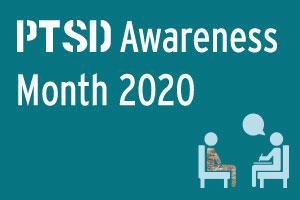By Holly O'Reilly, Ph.D.
June 22, 2020
 PHCoE graphic
PHCoE graphic
Each June, the Department of Defense (DOD) joins the national effort to promote awareness of posttraumatic stress disorder. PTSD is a mental health condition that may arise following exposure to a trauma such as combat, a natural disaster, or an assault. Individuals with PTSD experience distressing and intrusive memories of the trauma as well as avoidance, hyperarousal, and negative thoughts and mood. DOD provides numerous resources in support of PTSD awareness and treatment.
In years past, behavioral health providers had limited treatment options for the reduction of PTSD symptoms. Today we have numerous evidence-based interventions that are recommended for PTSD treatment in the Military Health System (MHS). In an effort to raise awareness of these treatment options, I'll summarize several below. Each summary includes relevant resources and an associated PHCoE Psych Health Evidence Brief which provides an overview of the scientific evidence supporting the treatment. PHCoE currently offers 23 evidence briefs for established and new treatments for PTSD.
Prolonged Exposure Therapy (PE)
PE is one of the first treatments that was proven to be effective in decreasing symptoms of PTSD. Treatment usually lasts for three or four months if sessions are conducted weekly, but there is emerging evidence of success conducting sessions more than once a week. PE teaches the patient to gradually approach trauma-related memories and other feelings or situations that have been avoided post-trauma. A cognitive-behavioral approach is used by PE, it's been extensively examined, and many DOD mental health clinicians have been trained in this method.
Cognitive Processing Therapy (CPT)
CPT is another of the earliest therapies proven to be effective for treatment of PTSD. It was originally developed to treat individuals with a history of sexual trauma, but has been shown to be effective across a range of trauma types. CPT is a cognitive-behavioral therapy which allows the patient to change the trauma-related thoughts and emotions they experience. Like PE, CPT has been extensively examined, many DOD mental health clinicians have been trained in it, and it can be conducted individually or in a group format. Treatment usually is completed within three to four months.
Stress Inoculation Therapy
SIT is another well-established treatment for PTSD. SIT helps the patient to recognize triggers and learn several coping skills that can be very helpful when managing anxiety. SIT is a cognitive-behavioral approach and many behavioral health providers have been trained in this approach. Treatment is usually completed in three to four months.
Written Exposure Therapy
The WET protocol is an evidence-based, trauma-focused treatment which may lead to a clinically significant reduction in PTSD symptoms in five treatment sessions. In WET, the clinician provides psychoeducation and guides the patient in completion of a written trauma narrative. During the following sessions, the patient completes the narrative and the clinician gives feedback on the changes in response to the trauma narrative. WET has growing evidence to support its efficacy and treatment can be completed in five weekly sessions.
Yoga
Yoga is a mind and body practice with an extensive history. Various yoga styles combine breathing techniques, relaxation, and physical postures, and are often a useful intervention to promote health, fitness, and meditation. Recently, researchers have begun exploring the use of yoga to treat PTSD. The current evidence base does not support yoga as a first-line treatment for PTSD, however, it may be used as an adjunct to other evidence-based treatments for PTSD.
Additional Resources
- PTSD Coach app: Provides psychoeducation about PTSD and tools to help manage the stresses of daily life with PTSD and can be used independent of treatment.
- PTSD Family Coach app: Provides detailed information about PTSD and helpful strategies for self-care and helping loved ones get treatment for PTSD.
Dr. O'Reilly is a clinical psychologist and sexual assault/sexual harassment subject matter expert at the Psychological Health Center of Excellence. She specializes in the consequences of psychological trauma and women's mental health